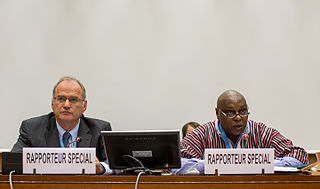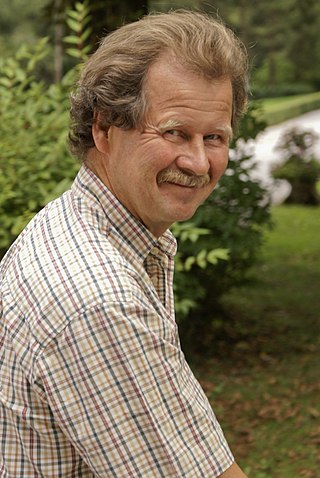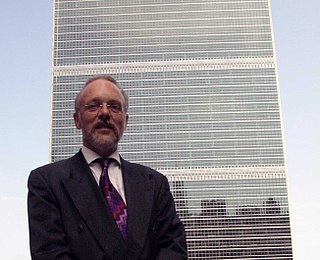Members of the WEIGD
| Name [13] | Country | Since [14] |
|---|---|---|
| Mr. Bernard Duhaime | 2014 | |
| Mr. Tae-Ung Baik | 2015 | |
| Ms Houria Es-Slami | 2014 | |
| Mr. Henrikas Mickevičius | 2015 | |
| Mr. Luciano A. Hazan | 2017 |
The Working Group on Enforced or Involuntary Disappearances has been set up to investigate cases in which persons are detained or killed by states in secret prisons and the corpses are disposed of so that nothing can be proven to them.
The UN Human Rights Commission created this body on February 29, 1980 by means of a resolution, [1] which also defined the mandate. This UN mandate is limited to three years and is regularly renewed. After the UN Human Rights Commission was replaced in 2006 by the UN Human Rights Council, [2] [3] it is now in charge and exercising oversight. The last extension of the mandate took place on October 6, 2020.
The members of the working group are not United Nations staff but are mandated by the UN [4] [5] and the UN Human Rights Council has adopted a code of conduct. [6] The independent status of elected representatives is crucial for the impartial performance of their duties. [7] The term of office of a mandate is limited to a maximum of six years. [8]
The working group prepares thematic studies and develops guidelines for the improvement of human rights. She makes country visits [9] and can make recommendations in an advisory capacity. [10] Its tasks include examining communications [11] and proposing to States how to remedy any abuses. It also makes follow-up procedures, [12] in which it reviews the implementation of the recommendations. To this end, it draws up annual reports to the attention of the UN Human Rights Council and the UN General Assembly.
| Name [13] | Country | Since [14] |
|---|---|---|
| Mr. Bernard Duhaime | 2014 | |
| Mr. Tae-Ung Baik | 2015 | |
| Ms Houria Es-Slami | 2014 | |
| Mr. Henrikas Mickevičius | 2015 | |
| Mr. Luciano A. Hazan | 2017 |
Refer to the International Convention for the Protection of All Persons from Enforced Disappearance.
The United Nations Commission on Human Rights (UNCHR) was a functional commission within the overall framework of the United Nations from 1946 until it was replaced by the United Nations Human Rights Council in 2006. It was a subsidiary body of the UN Economic and Social Council (ECOSOC), and was also assisted in its work by the Office of the United Nations High Commissioner for Human Rights (UNOHCHR).

An enforced disappearance is the secret abduction or imprisonment of a person with the support or acquiescence of a state followed by a refusal to acknowledge the person's fate or whereabouts with the intent of placing the victim outside the protection of the law. Often, forced disappearance implies murder whereby a victim is abducted, may be illegally detained, and is often tortured during interrogation, ultimately killed, and the body disposed of secretly. The party committing the murder has plausible deniability as there is no evidence of the victim's death.

Special rapporteur is the title given to independent human rights experts whose expertise is called upon by the United Nations (UN) to report or advise on human rights from a thematic or country-specific perspective.

Jean-Pol Martin studied teacher education for foreign language teachers in Germany, and developed a teaching method called learning by teaching. He spent most of his career at Catholic University of Eichstätt-Ingolstadt and was a Professor there when he retired in 2008.
The International Day of the Disappeared, on August 30 of each year, is a day created to draw attention to the fate of individuals imprisoned at places and under poor conditions unknown to their relatives and/or legal representatives. The impulse for the day came from the Latin American Federation of Associations for Relatives of Detained-Disappeared (Federación Latinoamericana de Asociaciones de Familiares de Detenidos-Desaparecidos, or FEDEFAM), a non-governmental organization founded in 1981 in Costa Rica as an association of local and regional groups actively working against secret imprisonment, forced disappearances and abduction in a number of Latin-American countries.

Manfred Nowak is an Austrian human rights expert, who served as the United Nations Special Rapporteur on Torture from 2004 to 2010. He is Secretary General of the Global Campus of Human Rights in Venice, Italy, Professor of International Human Rights, and Scientific Director of the Vienna Master of Arts in Applied Human Rights at the University of Applied Arts in Vienna. He is also co-founder and former Director of the Ludwig Boltzmann Institute of Human Rights and a former judge at the Human Rights Chamber for Bosnia and Herzegovina. In 2016, he was appointed Independent Expert leading the United Nations Global Study on Children Deprived of Liberty.
Felix Ermacora was a leading human rights expert of Austria and a member of the Austrian People's Party.
The Otto Hahn Peace Medal in Gold is named after the German nuclear chemist and 1944 Nobel Laureate Otto Hahn, an honorary citizen of Berlin.

The International Convention for the Protection of All Persons from Enforced Disappearance (ICPPED) is an international human rights instrument of the United Nations intended to prevent forced disappearance, which, as defined in international law, is part of crimes against humanity. The text was adopted by the United Nations General Assembly on 20 December 2006 and opened for signature on 6 February 2007. It entered into force on 23 December 2010. As of August 2024, 98 states have signed the convention and 76 have ratified or acceded to it.
The Working Group on Arbitrary Detention(WGAD) is a body of independent human rights experts that investigate cases of arbitrary arrest and detention. Arbitrary arrest and detention is the imprisonment or detainment of an individual, by a State, without respect for due process. These actions may be in violation of international human rights law.

Kindernothilfe (KNH) is a charity organization and was founded in 1959 by a group of Christians in Duisburg, Germany, in order to help needy children in India. Over time, it has become one of the largest Christian organizations in Europe for children's aid.

Angela Kane is a German diplomat and was formerly the UN High Representative for Disarmament Affairs and Under-Secretary-General for Management in the United Nations.

Gerhart Rudolf Baum is a German politician of the Free Democratic Party (FDP) and a lawyer. From 1978 to 1982 he served as Federal Minister of the Interior of the Federal Republic of Germany.
Sukhwinder Singh Bhatti was a criminal defense attorney in Sangrur district of Punjab, India, and the district's leading defense lawyer for individuals accused of crimes under the Terrorist and Disruptive Activities (Prevention) Act (TADA). TADA was a law in effect from 1985 to 1995 that authorized the preventative detention of persons for up to two years in Punjab based only on suspicion of certain crimes done with the intent to cause terror. The law also established in camera courts, and under Section 21, detainees charged with certain crimes were presumed guilty until proven innocent.

Franz Baumann is a German former United Nations official who, until the end of 2015, served as Assistant Secretary-General and United Nations Special Adviser on Environment and Peace Operations at the United Nations Secretariat in New York. From 2017 to 2021, he was a visiting research professor at New York University and is now an adjunct professor at Georgetown University in Washington D.C.
The Lessons Learnt and Reconciliation Commission was a commission of inquiry appointed by Sri Lankan President Mahinda Rajapaksa in May 2010 after the 26-year-long civil war in Sri Lanka to function as a Truth and reconciliation commission. The commission was mandated to investigate the facts and circumstances which led to the failure of the ceasefire agreement made operational on 27 February 2002, the lessons that should be learnt from those events and the institutional, administrative and legislative measures which need to be taken in order to prevent any recurrence of such concerns in the future, and to promote further national unity and reconciliation among all communities. After an 18-month inquiry, the commission submitted its report to the President on 15 November 2011. The report was made public on 16 December 2011, after being tabled in the parliament.

Bonn UN Campus station is a railway station in the town of Bonn, North Rhine-Westphalia, Germany. The station lies on the West Rhine Railway. Its name is derived from the UN Campus, Bonn.

The post of Special Rapporteur on Minorities has been created as minorities in all regions of the world are exposed to serious threats, discrimination and racism and are often excluded from participation in economic, political and social life. It shall provide for the implementation of the Declaration on the Rights of Members of National or Ethnic, Religious and Linguistic Minorities, taking into account existing international norms and national minority laws.

The Committee Against Torture (CAT) is a treaty body of human rights experts that monitors implementation of the United Nations Convention against Torture by state parties. The committee is one of eight UN-linked human rights treaty bodies. All state parties are obliged under the convention to submit regular reports to the CAT on how rights are being implemented. Upon ratifying the convention, states must submit a report within one year, after which they are obliged to report every four years. The committee examines each report and addresses its concerns and recommendations to the state party in the form of "concluding observations." Under certain circumstances, the CAT may consider complaints or communications from individuals claiming that their rights under the convention have been violated.
Rüdiger König, is a German diplomat who served as the Permanent Representative of Germany to NATO from 2020 until 2023.